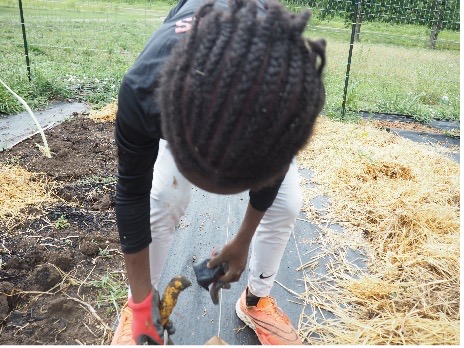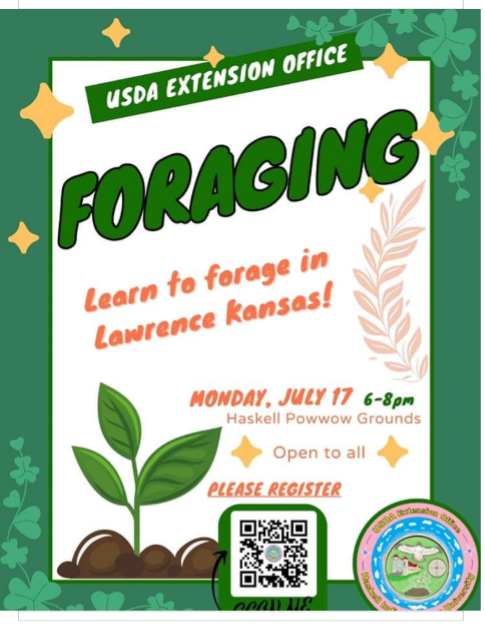
My name is Franklin Davis. I spent part of my summer helping in the Home Works USA Community. That’s me in the community garden.
I got to have some fun too. One of the things I did was go to Haskell and learn about foraging. It was lots of fun. I tasted everything I found and liked some of it. But not everything.
Here are edible plants you can find in Lawrence.
Hackberry, Elderberry, Mulberry, plum, cherry (prunus spp), ground cherries, Juniper, Redbud, Oak, Black walnut, Amaranth (amaranthus spp), Wild onion, Fragrant sumac, lambsquarters, Purslane, Curly dock, and my second favorite cattails.

Foraging can be fun. While I didn’t really forage in the Home Works Community, you can! I want you to be safe, so I looked for advice on how you forage safely and sustainably:
1. Learn from Experts: If you’re new to foraging, consider joining local foraging groups or
workshops led by experienced foragers. They can teach you about the edible plants and mushrooms in the area and how to identify them properly. One of the volunteers at Home Works, Sherri Grogan knows how to forage for mushrooms. If you have other experts, please share the information with the community.
2. Identify Edible Species: Learn to identify edible plants and mushrooms accurately. Never consume anything unless you are 100% sure of its identity. Some other common edible plants include dandelions, violets, and wild berries. We worked on restoring a berry patch taken over by poison ivy. We did not finish. Maybe you could help?
3. Practice Ethical Harvesting: Only take what you will use and be mindful of the environment. Avoid harvesting rare or protected species, and never take more than a small portion of any plant or mushroom population to ensure their sustainability.
4. Avoid Toxic Species: Learn to recognize and avoid toxic or poisonous plants and mushrooms. Some look like edible varieties but can be harmful or even fatal if you eat them.

5. Respect Private Property: Forage only in areas where you have permission to do so. You have permission to forage on the Home Works USA Community property. Please check in with the Community Manager. We would like to know who is on the property.
6. Protect the Environment: Leave no trace when foraging.
7. Be Mindful of Wildlife: Foraging often occurs on the walking trail. There are deer birds, wild turkeys, beavers, and other wildlife that live there. Be respectful of their habitats and avoid disturbing them.
8. Seasonal Awareness: Different plants and mushrooms are available at different times of the year. Adjust your foraging accordingly.
Always prioritize safety and sustainability when foraging. If you’re unsure about a plant or mushroom, don’t eat it. Instead, consult with an experienced forager or expert to confirm its identity.




